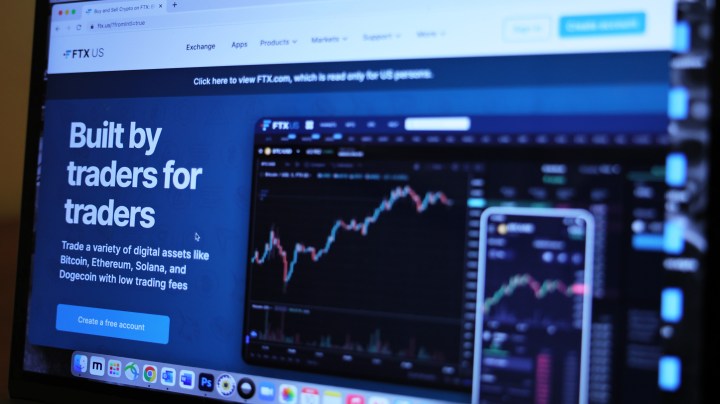
FTX debacle worsens crypto’s trust issues

It feels like a million years ago, but remember the whole terra luna thing? It was that big cryptocurrency platform that crashed in May and wiped out about $40 billion along with it.
Kyle Hamburger has a pretty vivid memory of it. “It was about a third of my savings at the time,” the San Diego tech consultant said. “So it was pretty important.”
Hamburger lost that money in a company called Stablegains, a crypto savings startup, which, unbeknownst to him and most of its users, was tied to terra luna.
The loss shook him up. But it didn’t shake him out of crypto. Hamburger put $25,000 into another crypto savings platform, called Donut.
When the news broke that FTX was going under, Hamburger immediately withdrew most of his money. He did it just in time; Donut ultimately suspended withdrawals.
“I just don’t trust crypto as a whole right now,” Hamburger said. “There’s so much uncertainty that it’s scary to be in this space.”
Hamburger’s remaining involvement with crypto is the $100 or so he has in an account at Coinbase, an exchange where investors can buy and sell various cryptocurrencies. FTX was also a crypto exchange, and that’s where Coinbase CEO Brian Armstrong would like the comparisons to end.
“The last 10 years we’ve been working to make this industry more trusted,” Armstrong said. “And my fear was that people would somehow conflate this with what we’re doing.”
Armstrong argues that because Coinbase is based in the U.S. and listed on the Nasdaq, the exchange is inherently more trustworthy; FTX was based in the Bahamas.
A lack of clear American regulation — like whether certain cryptocurrencies are securities or commodities — is pushing crypto into places where shady characters can thrive, he argued.
“I think what we need is thoughtful, clear regulation,” Armstrong said. “And once that clarity emerges in the U.S., I’m hoping we can build this industry in a more trusted and regulated way onshore.”
For a technology that’s supposed to be “trustless,” you’re now hearing crypto execs like Armstrong talk a lot about rebuilding trust.
Ironically, the regulatory gray area in the U.S. may have kept the FTX fallout from being worse.
“Regulation can confer legitimacy,” said Lee Reiners, policy director of the Financial Economics Center at Duke University law school. “And not only that, but regulation then can make it possible for new connections to form between the crypto economy and the traditional financial system.”
Reiners is a longtime crypto skeptic. In five years, with tough regulation, he said he’s pretty sure words like dogecoin, a cryptocurrency, and NFT, or non-fungible token, will fade from the vernacular.
“Ultimately for crypto to have value, it needs to offer a new product or service that people think is useful. And I just don’t see that happening,” Reiners said.
Both crypto skeptics and enthusiasts agree that the industry is at an inflection point. Either Reiners is right, and this will just fizzle into a small group of bitcoin true believers who will never trust banks, or maybe in five years, we’ll all be wearing virtual reality headsets, using ethereum to buy and sell Bored Apes in the Web3-powered metaverse.
For his part, Kyle Hamburger hasn’t sworn off putting money back into crypto someday.
“I mean, I can’t say that I won’t,” he said. “Who knows what the future will bring in terms of safety?”
For now, though, Hamburger is happy keeping his money in an FDIC-insured savings account.
There’s a lot happening in the world. Through it all, Marketplace is here for you.
You rely on Marketplace to break down the world’s events and tell you how it affects you in a fact-based, approachable way. We rely on your financial support to keep making that possible.
Your donation today powers the independent journalism that you rely on. For just $5/month, you can help sustain Marketplace so we can keep reporting on the things that matter to you.











